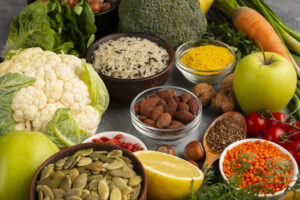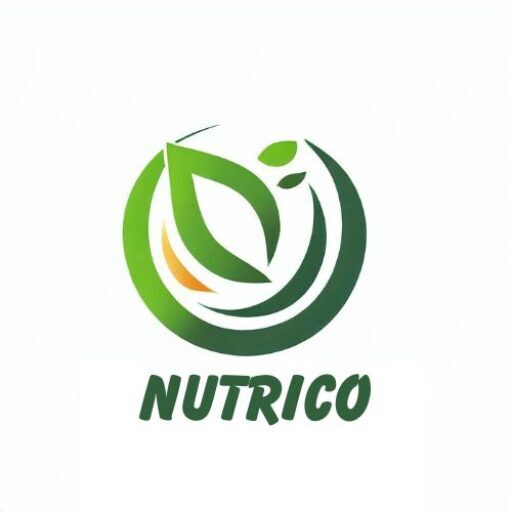Nutrient-Dense Foods are the superheroes of our diet, packing a powerful punch of essential vitamins, minerals, and other nutrients in every delicious bite. These foods offer a multitude of health benefits, from strengthening immunity and promoting healthy growth to enhancing cognitive function and lowering the risk of chronic diseases, all while delivering maximum nutritional value and little calories.
These nutrient-dense foods that power our bodies and replenish our souls include leafy greens like kale and spinach, colorful berries rich with antioxidants, lean meats like chicken and fish, and entire grains like quinoa and oats. Including foods high in nutrients in our regular meals not only fulfills our hunger but also guarantees that we grow and develop with each and every bite.
These foods are extremely nutritious and full of key nutrients that are important for our overall health and well-being. However, what precisely are foods high in nutrients, and why are they to form the mainstay of our diets? This post delves into the topic of nutritional density, highlighting its advantages, significance, and some excellent examples to include in your regular meals.

Gaining Knowledge about Nutrient Density
The concentration of vital elements, such as vitamins, minerals, protein, and good fats, per calorie in a particular food is referred to as nutritional density. Put more simply, it’s about obtaining the highest nutritious value for the least amount of money. nutritional-dense foods are very effective sources of nutrition because they have a high nutritional content compared to their calorie value.
The Value of Foods Rich in Nutrients:
Making nutrient-dense foods a priority is more important than ever in the fast-paced world of today, where convenience frequently takes precedence over nutrition. This is the reason why:
Ideal Well-Being:
Foods high in nutrients provide the necessary vitamins, minerals, and other chemicals required for a number of body processes, such as metabolism, immunological response, and tissue repair. Regular consumption of these foods gives your body the resources it needs to flourish and fend against disease.
Weight management:
Nutrient-dense foods are gratifying and full, in contrast to empty-calorie items that have minimal nutritional content and make you feel hungry soon after eating. They aid in appetite regulation, which makes it simpler to keep a healthy weight without experiencing continual cravings or hunger sensations.
Disease Prevention:
A diet high in nutrient-dense foods has been associated in numerous studies to a lower chance of developing chronic illnesses like diabetes, heart disease, and some types of cancer. These foods are rich in powerful antioxidants and anti-inflammatory substances that are essential for preventing cellular damage and reducing inflammation, which in turn reduces the risk of disease.
Energy and Vitality:
Our bodies require nutrient-dense foods to operate at their best, just as a car needs premium fuel to run smoothly. These foods give you a consistent supply of energy and support general vitality, which makes you feel more alert and energized all day.
Nutrient-Dense Food Examples
Now that we are aware of how important nutrient density is, let’s look at some of these superfoods:
Leafy Greens:
Rich in calcium and magnesium, as well as vitamins A, C, K, and folate, dark leafy greens such as kale, spinach, and Swiss chard are nutritional powerhouses. Adding these greens to stir-fries, smoothies, or salads is a simple method to increase your nutrient intake.
Berries:
In addition to being delicious, berries like blueberries, strawberries, and raspberries are also a great source of vitamins, fiber, and antioxidants. These vibrant fruits provide vital nutrients that support heart, brain, and immune system health along with a sweet and tangy flavor burst.
Salmon:
Omega-3 fatty acids, which are essential for heart and brain health, are found in high concentrations in fatty fish, such as salmon. Salmon is also a great source of protein, vitamin D, and B vitamins, including B12 and niacin. For best results, try to include at least two servings of oily fish each week in your diet.
Quinoa:
Packed full of all nine essential amino acids, quinoa is a complete protein source that is great for vegans and vegetarians. Furthermore, quinoa is an incredibly nutrient-dense and adaptable grain substitute because it’s high in fiber, iron, magnesium, and antioxidants.
Nuts and Seeds:
Packed with heart-healthy fats, protein, fiber, and an array of vitamins and minerals, almonds, walnuts, chia seeds, and flaxseeds are nutrient-dense snacks. For an extra nutritional boost, sprinkle them over salads, yoghurt, and oatmeal. You can also eat them as a quick and easy snack.
Including Foods High in Nutrients in Your Diet:
After going over some important instances of nutrient-dense foods, let’s talk about some doable strategies for including them in your regular meals:
Get a Good Start to the Day:
Start your day with a nutrient-dense breakfast that includes items like Greek yogurt with berries and almonds on top or an omelet with spinach and mushrooms and avocado on the side.
Create Well-Balanced Meals:
Try to incorporate a range of nutrient-dense foods from various food groups in your meal plans. Distribute the lean protein sources, such as fish or poultry, quarter of your plate among colorful fruits and vegetables, and the remaining quarter among nutritious grains or legumes.
Get Creative:
To keep meals interesting and delectable, try experimenting with different cooking techniques and taste combinations. Try roasting veggies with spices and herbs, integrating new grains like barley or farro into soups and stews, and dressing salads with fresh herbs and citrus zest.
Remain Hydrated:
Recall how crucial staying hydrated is to preserving general health. Water is necessary for the body’s different physiological functions as well as the movement of nutrients throughout the body. Make it a point to stay hydrated throughout the day and think about including foods high in water content, such as citrus fruits, cucumbers, and watermelon, in your diet.
Setting Nutrient-Dense Meals as a top priority is essential for supporting good health in a world full of processed foods and fad diets. Everyday meals can be enriched with a range of Nutrient-Dense Foods, providing our bodies with the vital vitamins, minerals, and other substances they require to flourish. There are many tasty options for nutrient-dense foods, such as leafy greens, berries, salmon, almonds, and quinoa. Thus, take control of your health now by include nutritional density as a mainstay in your diet, and enjoy the long-term advantages of bright health and energy.

